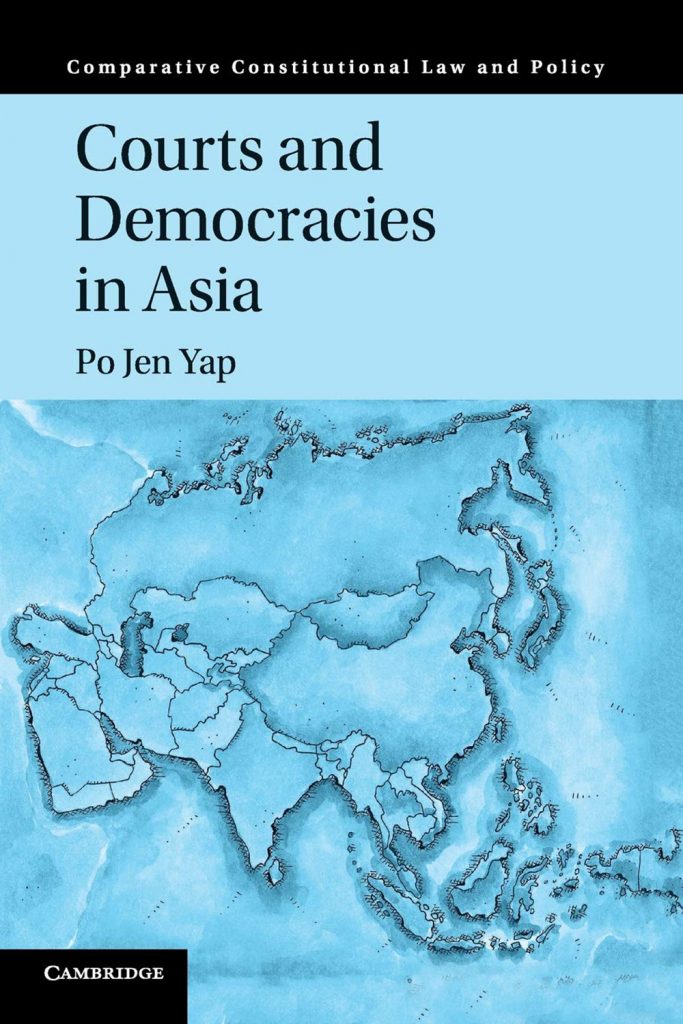May 2020 | Volume 21 No. 2
Democracy and Judicial Behaviour in Asia
Democracies come in different forms. Some are effectively ruled by a dominant party that has muted most opposition. Some are dynamic, with two or more parties that have taken turns in power. Others are more fragile, with a strong military that may seize power if there is a vacuum. Each system shapes judicial behaviour in different ways, according to Professor Yap Po-jen.
Professor Yap has studied the political factors that strengthen or constrain judiciaries in Asia. He has also been looking at how some of these judicial systems are converging by intentionally adopting constitutional practices from the West.
“Judges today no longer simply interpret the law, they also make law that binds their governments and citizens. The level of democratisation in a political system can impact judicial behaviour, and judicial behaviour can also facilitate the democratisation of a system,” he said.
His first major study on the topic, the monograph Courts and Democracies in Asia published in 2017, examined nine Asian democracies – three dominant-party (Hong Kong, Singapore and Malaysia), three dynamic (Taiwan, South Korea and India) and three fragile (Pakistan, Thailand and Bangladesh).

Professor Yap’s monograph Courts and Democracies in Asia was published in 2017.
Protecting independence
The dominant democracies are practically ruled by one coalition or its proxies (in Hong Kong, the pro-Beijing forces) and their judiciaries can be easily overruled by the political branches of government.
Nevertheless, the courts in these places can still assert some autonomy within bounds – for instance, Hong Kong courts have ruled against the government on multiple occasions on issues relating to social welfare and gay rights. Where the courts cross the tolerance threshold of the government, they will be punished or overridden, as seen in Singapore and Malaysia.
“All dominant parties will eventually fade away with time, even if this may take a long while. In the meantime, the role of their courts is to do what they can, while protecting their institutional independence. If they rule too aggressively, the dominant party will clip their wings,” Professor Yap said.
In the dynamic democracies, because power changes hands between political parties, the courts are not beholden to any single party and can act more independently. This means judges can make systemic changes to the electoral system, such as correcting gerrymandering in South Korea and overturning constitutional amendments that suspended elections in Taiwan. “Unlike courts in dominant party democracies that have a minor role in making systemic changes, those courts in two-party systems can actually facilitate systemic political change,” he said.
In fragile democracies, the military is not under the control of the government and can veto or overthrow the government if they are displeased with its decisions. Judges must walk a very careful line. “My prescriptive argument for these courts is that they should impose limits on the government but not in a way that triggers or facilitates martial law” – something that has happened in Pakistan and Thailand when court rulings went against the government of the day.
The most liberal systems
Despite their differences, courts in some of these systems have been converging in their approaches, namely Hong Kong, Taiwan and South Korea. They have all applied the doctrine of proportionality to strike down legislation. The latest example is the Hong Kong Court of First Instance’s recent decision to give same-sex couples who are legally married overseas access to public housing. And these three courts have all used Suspension Orders to give their governments time to fix a law before a court order comes into effect, as they did with transsexual marriage in Hong Kong, same-sex marriage in Taiwan, and anti-abortion legislation in South Korea.
“With proportionality, courts often say that the government is pursuing a legitimate aim but has gone too far. It’s about determining whether the government’s actions are balanced,” he said.
Professor Yap notes that these three jurisdictions are not intentionally converging with each other, but are converging with practices in the West, from where they actively seek guidance – Hong Kong from the United Kingdom and Canada, and Korea and Taiwan from Germany. Insofar as Western Europe and Canada are in sync, the Asian jurisdictions indirectly converge.
He also thinks it is significant that in these three Asian systems, the judiciaries enjoy judicial independence (even Hong Kong, where an independent commission selects judges for appointment) and the legislatures are fragmented – Taiwan and South Korea because they are two-party systems and Hong Kong because the Pro-Beijing legislators do not vote as a monolithic block on issues not core to Beijing.
“If we are talking about human rights in general, Hong Kong, Taiwan and South Korea appear to be the most liberal systems in Asia precisely because of these variables. The fragmented political spaces don’t allow one party all the power to decide all legislative decisions. Judges are not accountable to just one political party. And there is intentionality on the part of the bench to converge with Western human rights laws,” he said.
Judges today no longer simply interpret the law, they also make law that binds their governments and citizens.

PROFESSOR YAP PO-JEN

